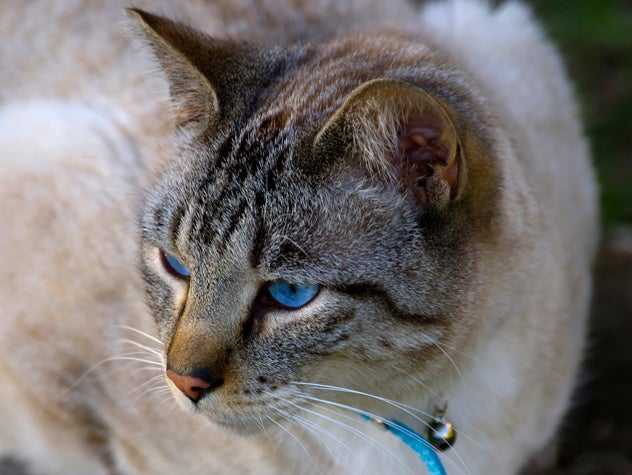Effects of Second Hand Smoke on Pets

The following is an excerpt from the Petfinder Blog.
It seems like a no-brainer that smoking around your pet is bad. But how dangerous is secondhand smoke to pets? After all, your pet’s not getting that much exposure to cancer-causing chemicals, right?
Wrong. Pets spend a lot more time than you do in your home — increasing their exposure to carcinogenic substances. And those substances are just as dangerous for pets as they are for humans. “Dog and cat lungs are virtually identical to human lungs,” says Dr. Jan Bellows, DVM, a veterinarian at All Pets Dental Clinic in Weston, FL.
Here’s what recent studies have to say about the dangers:
Dogs and secondhand smoke
Studies suggest that muzzle length plays a role in the type of cancer a dog is likely to develop from secondhand smoke. According to a survey of recent research on LiveScience.com, dogs with long muzzles are more likely to develop nose and sinus cancers, since their noses and sinuses have more surface area on which carcinogens can accumulate, while dogs with short and medium-length muzzles are more likely to develop lung cancer.
Cats and secondhand smoke
Cats are more prone to develop cancers of the mouth and lymph nodes because of secondhand smoke. When cats groom themselves, they lick up the toxic substances that have accumulated on their fur. “This grooming behavior exposes the mucous membranes of their mouth to the cancer-causing carcinogens,” veterinarian Carolynn MacAllister of Oklahoma State University tells LiveScience.com.
In fact, a study published in the American Journal of Epidemiology found that cats living in homes where someone smokes a pack of cigarettes or more each day are three times more likely to develop malignant lymphoma than cats living with nonsmokers. And a study published in Veterinary Medicine found that cats exposed to smoke from one to 19 cigarettes a day are four times more likely to be diagnosed with squamous cell carcinoma — the most common and an aggressive type of oral cancer in cats.
Small animals and secondhand smoke
Birds are extremely sensitive to air pollutants and are at risk for lung cancer and pneumonia when exposed to secondhand smoke. Secondhand smoke has also been found to cause heart problems in rabbits.
The nicotine in cigarettes is also highly toxic to pets if ingested, so keeping cigarettes out of the house entirely is always the best bet.
Fortunately, in a 2008 study in the journal Tobacco Control, nearly one third of pet-parent smokers surveyed said information about the dangers of secondhand smoke to their pets would motivate them to try to quit smoking. So be sure to share this info with anyone you know who smokes. Believe me, they don’t want to one day get the call from their vet that we all fear — saying, “It’s malignant.”